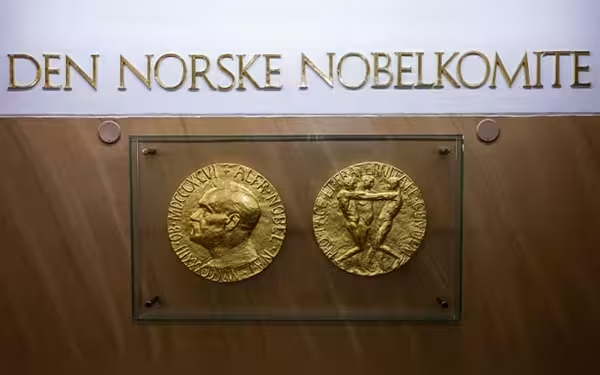Saturday, November 16, 2024 09:38 PM
Nobel Prize Predictions: Cancer Research and Cardiovascular Drugs in Focus
- Kevan Shokat's work on KRAS cancer gene shows promise.
- New cholesterol-lowering drugs developed by Cohen and Hobbs.
- Neuroscientists explore brain's basal ganglia for behavior insights.
 Image Credits: geo
Image Credits: geoNobel Prize week highlights advancements in cancer research and cardiovascular drugs, with potential laureates making significant contributions.
The Nobel Prize week is upon us, a time when the world eagerly anticipates the recognition of groundbreaking achievements in various fields. Since its inception in 1901, the Nobel Prizes have celebrated individuals and groups who have made significant contributions to humanity. This year, the spotlight is on advancements in cancer research and cardiovascular drugs, which are expected to be among the frontrunners for the prestigious awards.
The Nobel Prize in Medicine is set to be announced on Monday at approximately 11:30 AM in Stockholm. Among the potential laureates is Kevan Shokat, an American biologist renowned for his work on the KRAS cancer gene. This gene is responsible for about one-third of all cancers, including some of the most difficult to treat, such as lung, colon, and pancreatic tumors. Shokat's discovery has paved the way for new treatment options, offering hope to countless patients battling these aggressive diseases.
In addition to cancer research, the field of cardiovascular health is also in the running for recognition. Geneticists Jonathan Cohen and Helen Hobbs have made significant strides in understanding how certain genes regulate lipid metabolism, particularly cholesterol. Their research has led to the development of a new class of cholesterol-lowering drugs, which could have a profound impact on public health.
Moreover, the week will also highlight the work of neuroscientists who have delved into the basal ganglia, a brain region crucial for motivation and reward. The trio of researchers—Ann Graybiel from the United States, Okihide Hikosaka from Japan, and Wolfram Schultz, who was born in Germany—has contributed valuable insights into how this area of the brain influences our behavior.
Other noteworthy contenders include Davor Solter and Azim Surani, who have explored the fascinating field of epigenetics. Their research focuses on how cells manage gene activity without altering the DNA itself, a discovery that could revolutionize our understanding of genetics.
Last year, the Nobel Prize in Medicine was awarded to Katalin Kariko and Drew Weissman for their pioneering work on messenger RNA technology, which played a crucial role in the development of COVID-19 vaccines. This year, as the world grapples with numerous crises, the predictions for the Peace Prize are particularly challenging. Potential candidates include the UN agency for Palestinian refugees, the International Court of Justice, and Afghan women's rights activist Mahbouba Seraj. Additionally, the Campaign to Stop Killer Robots has emerged as a possible laureate, highlighting the urgent need to address the ethical implications of autonomous weapons.
The Nobel Prize in Economics will conclude the 2024 Nobel season on October 14, with research on child development, the integration of nature into the economy, and the effects of corruption on economic growth being potential areas of focus.
As we await the announcements, it is essential to recognize the profound impact that these scientific advancements and humanitarian efforts can have on our world. The Nobel Prizes not only honor individual achievements but also inspire future generations to pursue knowledge and innovation. In a time filled with challenges, these awards serve as a reminder of the resilience of the human spirit and the ongoing quest for progress.













